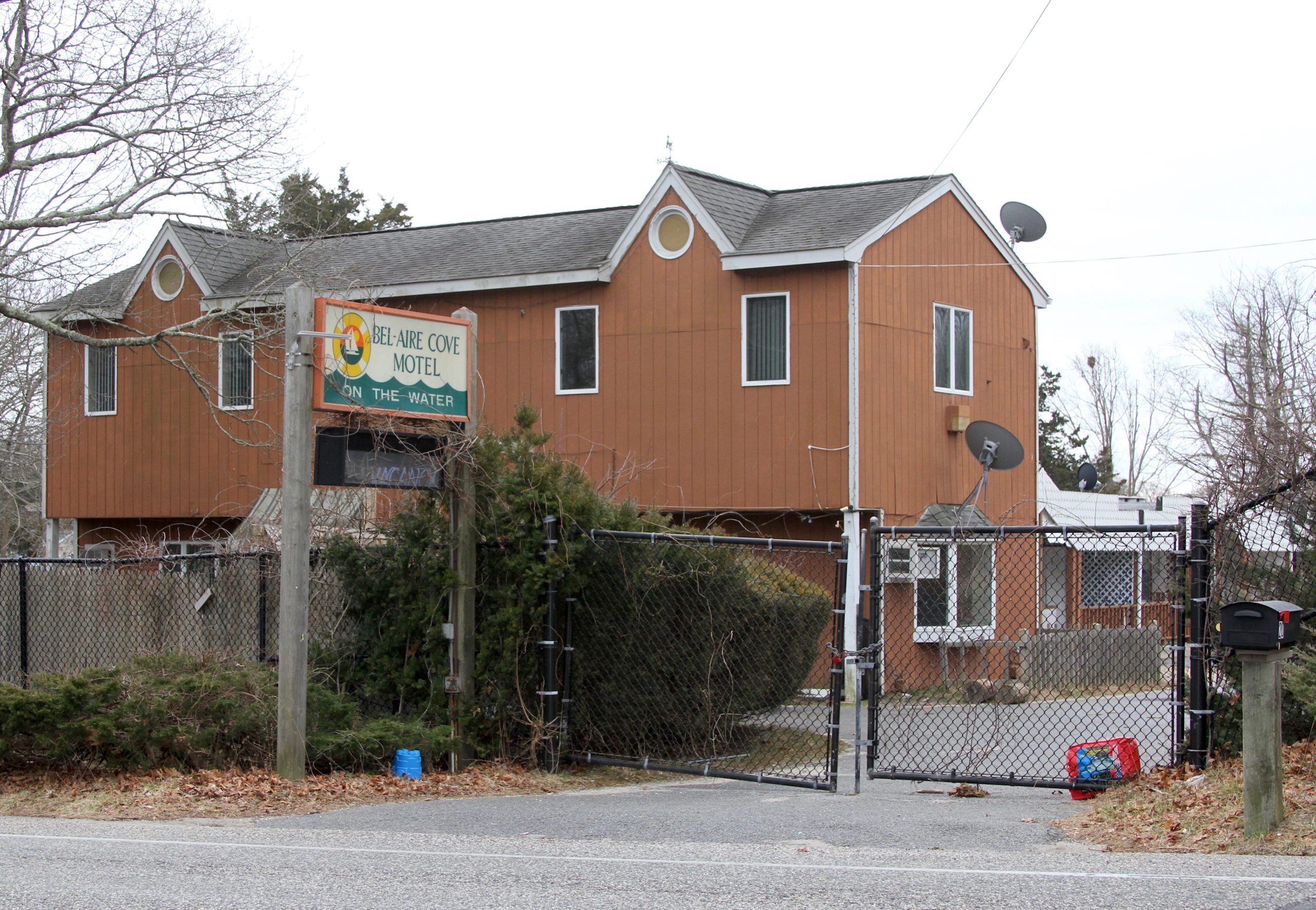Three Women Sue Southampton

Most Hampton Bays community members who spoke on the Town of Southampton purchasing the Bel-Aire Cove Motel and turning it into condominiums or a boutique hotel were opposed to the idea. So, after the town board in a 4-1 vote decided to purchase it anyway and adopt an urban renewal plan to flip the property, three women decided to sue.
Doreen Bartoldus, Elizabeth Hook, and Mary Pazan filed an Article 78 on August 8 through Hook’s Southampton-based law firm Braxton Hook. The 26-year attorney and her co-petitioners are ordering the town to conduct an environmental quality review before the town spends any money on the project. The resolution adopting the waterfront revitalization plan stated it would have no adverse environmental impact and did not need the extensive review under the State Environmental Quality Review Act.
The trio is also arguing the town board failed to consider other uses for the Bel-Aire property, which was purchased under a town resolution for $1.06 million. The board’s sole Republican at the time, Christine Preston Scalera, was the only member who voted against the measure, and the only one who, like most residents in opposition, asked the purchase be made with Community Preservation Fund money with a plan to either preserve the parcel or turn it into a pocket park. The CPF is funded through a two-percent tax on real estate transfers, and 10 percent of that fund can now be used for water quality improvement projects, which residents asserted was advantageous in this case.
Adopting a waterfront plan that provides no other use for blighted properties is “arbitrary and capricious,” the lawsuit states, adding no economic analysis was conducted to support the need for a hotel or condos in the hamlet.
Hampton Bays Civic Association president Maria Hults said during a previous public hearing that studies have documented the motel is directly polluting Shinnecock Bay with fecal matter. Because the Southampton Trustees own adjacent land, she thought it would be fitting to make the area a community park.
“You can have a healthy smoothie and walk down to the water,” Hults said. “It would be wonderful to launch kayaks from there.”
The Article 78 also emphasizes the adopted plan fails to include information required under Article 15 — the Urban Renewal Law of the New York General Municipal Code — particularly the code enforcement piece. “This is especially important, since it is the failure of the town’s code enforcement that has caused the current illegal use and ‘blight,’” at the site, the lawsuit states.
The motel, which has operated as a year-round residence, had been the source of many complaints and was cited with code violations for overcrowding, bedbugs, and missing smoke detectors during an October 2017 raid.
“Incredibly, this town board has made the decision that it will contravene all prior zoning laws and its own 2016 Coastal Resources Plan to enforce its own vision of what is best for Hampton Bays,” the court documents read. “The town board has failed to consider the effects of the waterfront plan’s goal to transform multiple properties in Hampton Bays. The plan specifically states that its goal is to increase development and redevelopment in Hampton Bays waterfront properties in direct conflict with the zoning laws and the 2016 Coastal Resources Plan that were designed to curb and control such development.”
The 2016 Coastal Resources Plan warned against development that alters properties with economically valuable uses to privatized waterfront ones. It specifically advises against converting hotels or motels to condominium uses in resort zones, and supports allowing nonconforming uses revert to original zoning designations. The Bel-Aire Cove Motel was originally zoned residential.
Southampton Town Supervisor Jay Schneiderman declined to comment on the lawsuit citing the town’s policy regarding pending litigation, but the town board has still been discussing next steps for the recently-purchase property since a work session last month.
“I’ve been hearing from interested parties and no one seems to be interested in the motel,” Schneiderman said during that meeting. “Developers are interested in the condos. At least three people contacted my office.”
The town is looking to grandfather any existing rights to plumbing and septic flow from the Suffolk County Department of Health Services, according to town planning and development administrator Janice Scherer, before the building can be demolished. From there, Southampton will look to secure necessary permits from the planning board, building department, and health department, and then auction the property off to the highest bidder.
The two parties presented oral arguments January 30 before Justice Sanford Berland and are due back in court April 6.
“We talked about revitalizing the Hampton Bays community and stimulating the economy,” Schneiderman said previously on what he has touted an “out-of-the-box” plan. “I’ve been working for three years on this property trying to come up with a community-based solution that would get it to be a positive part of the local economy in Hampton Bays — to clean up the issues around the septic system, to have it be something that would pay a higher tax to the school district than it’s currently paying, and to have it be a hotel once again.”
desiree@indyeastend.com



